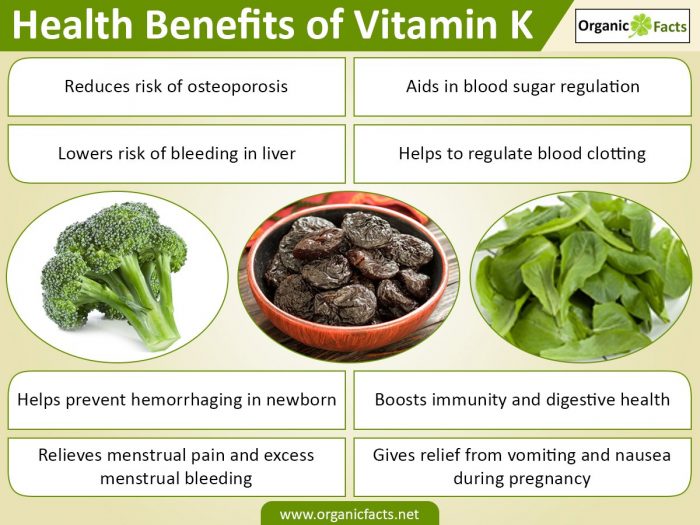The health benefits of vitamin K include a healthy heart, prevention of osteoporosis, relief from menstrual pain, protection from internal bleeding, prevention of biliary obstruction, and reduced menstrual flow.
Vitamin K is considered to be a fat-soluble vitamin, which is present in the intestines of the human body. The most vital role that this vitamin plays is in controlling blood clotting and preventing blood loss during injury. It also helps in assisting the absorption of calcium content from food, which helps in the formation and maintenance of healthy bones.
Table of Contents
- Vitamin K Deficiency [1]
- Types [2]
- Vitamin K-rich Foods [3]
- Health Benefits of Vitamin K
- Prevents Osteoporosis
- Reduces Blood Clotting
- Improves Heart Health
- Reduces Excessive Menstrual flow
- Prevents Internal Bleeding
- Improves Cognitive Health
- Decreases Menstrual Pain
- Relieves Nausea During Pregnancy
- Prevents Hemorrhaging in Babies
- Prevents Biliary Obstruction
- Protects the Immune System
- Regulates Blood Sugar
- Recommended Daily Intake [17]
- Side Effects of Vitamin K [18]
Vitamin K Deficiency
A vitamin K deficiency is usually found in infants since the placenta is not a very good carrier of this nutrient, thereby resulting in the development of conditions like vitamin K deficiency bleeding (VKDB). A vitamin K deficiency can easily turn into osteoporosis or a serious heart condition. [19]
Types
Vitamin K consists of a group containing 2-methyl-naphthoquinone derivatives. The three notable forms of this vitamin are K1 (phytonadione, phylloquinone, phytonadione), K2 (menaquinones), which is formed by natural bacteria present in the intestines, and K3 (menadione).
Vitamin K-rich Foods
A list of vitamin K rich foods includes the following:
- Vegetables: Collards, dandelion greens, mustard greens, beans, turnip greens, kale, parsley, cabbage, spinach, lettuce, and broccoli.
- Strawberry
- Eggs
- Chicken liver
- Fish
Health Benefits of Vitamin K
The health benefits of vitamin K include the following:

Vitamin K helps your body by making proteins for healthy bones. Photo Credit: Shutterstock
Prevents Osteoporosis
Vitamin K plays a key role in preventing osteoporosis and loss of bone mineral density, according to Dr. Debra Pearson of the University of Wisconsin-Green Bay. The intake of leafy vegetables, collard greens, broccoli, spinach, brussels sprouts, and lettuce, all of which are rich in this vitamin, helps prevent the signs and symptoms. Even cow milk is a good and rich source of this vitamin and helps in improving bone mineral density. The major symptom of osteoporosis is the reduction of bone density. It typically occurs after the age of fifty and is found in many post-menopausal women. The bone attains maximum strength and density by the time an individual’s age reaches 20-30. this peak time, the bone-building starts to wane and the bone mineral density reduces. [20] [21]
Reduces Blood Clotting
Vitamin K helps in the regulation of blood clotting by transporting calcium around the body. It plays a key role in the amalgamation of prothrombin that happens at the time of injury due to the tears in blood vessels. Protein Z helps in enhancing the action done by thrombin so as to promote an association with phospholipids that are present in cell membranes. It further helps in treating myelodysplastic syndromes. This vitamin also increases blood circulation in tissues and peripheral bodies. Osteoporosis and Sarcopenia also show a link between vitamin K and platelet aggregation. [22] [23]
Improves Heart Health
Vitamin K is a strong inhibitor of arterial calcification. It prevents calcium deposition on the heart walls. Dr. Katarzyna Maresz, president and scientific coordinator of International Science and Health Foundation in Krakow, Poland, says, “An increased intake of vitamin K2 could be a means of lowering calcium-associated health risks.” [24]
Reduces Excessive Menstrual flow
Vitamin K deficiency can lead to a woman experiencing excess menstrual bleeding. Therefore intake of adequate amounts of vitamin k is important and will reduce the blood flow.
Prevents Internal Bleeding
Vitamin K helps in reducing the threat of bleeding in the liver, poor nutrient absorption, jaundice or the combination of the long-term use of antibiotics or aspirin. Some of the problems associated with the gastrointestinal system due to a decrease of this vitamin include obstructions, sprue, and colitis. These are due to the reduced content of this vitamin.
Improves Cognitive Health
As per a 2013 study, published in the journal – Neurobiology of Aging, vitamin k plays a very important in role in brain development and improving cognitive function. It is also responsible for preventing degenerative conditions among older people by improving their episodic memory. [25]
Decreases Menstrual Pain
Vitamin K helps in regulating the menstrual cycle by ensuring the optimal functioning of the hormones helps in reducing the associated menstrual pain.
Relieves Nausea During Pregnancy
Pregnant women suffering from vomiting and nausea are often deficient in vitamin K. This vitamin intake will show good results by providing relief in less than seventy-two hours and preventing mild forms of these symptoms in the future.
Prevents Hemorrhaging in Babies
This vitamin is injected into new-born to prevent hemorrhaging. Oral intake of vitamin K through drops is also helpful for asthmatic children.
Prevents Biliary Obstruction
Prolonged treatment with oral antibiotics causes biliary obstruction, regional enteritis, and ulcerative colitis, and is made even worse due to a deficiency of vitamin K. Therefore, regular intake of this vitamin can prevent these complications from occurring.
Protects the Immune System
In order to boost vitamin K levels, the intake of young coconut kefir, coco-biotic, raw cultured vegetables, milk kefir, liquid spirulina by a human body can be very beneficial. This will help in increasing the content of this vitamin and protect the digestive and immune systems.

Vitamin K helps in keeping your bones healthy. Photo Credit: Shutterstock
Regulates Blood Sugar
Vitamin K plays an important role in regulating blood sugar levels and reducing the risk of developing diabetes, as per a research published in the journal Diabetes Care. It is believed that vitamin k supplementation is more effective in preventing diabetes among older men when compared to women. [26]
Recommended Daily Intake
The recommended daily intake of vitamin K varies from birth to adulthood. Let us discuss it in detail below.
- Up to 6 months: 2.0 mcg
- 7-12 months: 2.5 mcg
- 1-3 years: 30 mcg
- 4-8 years: 55 mcg
- 9-13 years: 60 mcg
- 14-20 years: 75 mcg
- 20+ years: 120 mcg
Side Effects of Vitamin K
With any supplement or food, there is a certain level of precaution that should be taken, or otherwise, it can have negative effects on the body. Let us discuss them below:
- Pregnancy: Pregnant women are advised to avoid vitamin K supplements on a daily basis without prior consultation with their doctors.
- Drug interaction: People who are taking blood-thinning medication, like Coumadin, should also avoid vitamin K rich foods as this would interfere with their treatment.
- Blood clotting: Those who are experiencing blood clotting should also avoid the intake of vitamin K, as it only works towards it and not against it. If you have a prior history with serious conditions like stroke or cardiac arrest, do not take vitamin K supplements without consulting your doctor.
